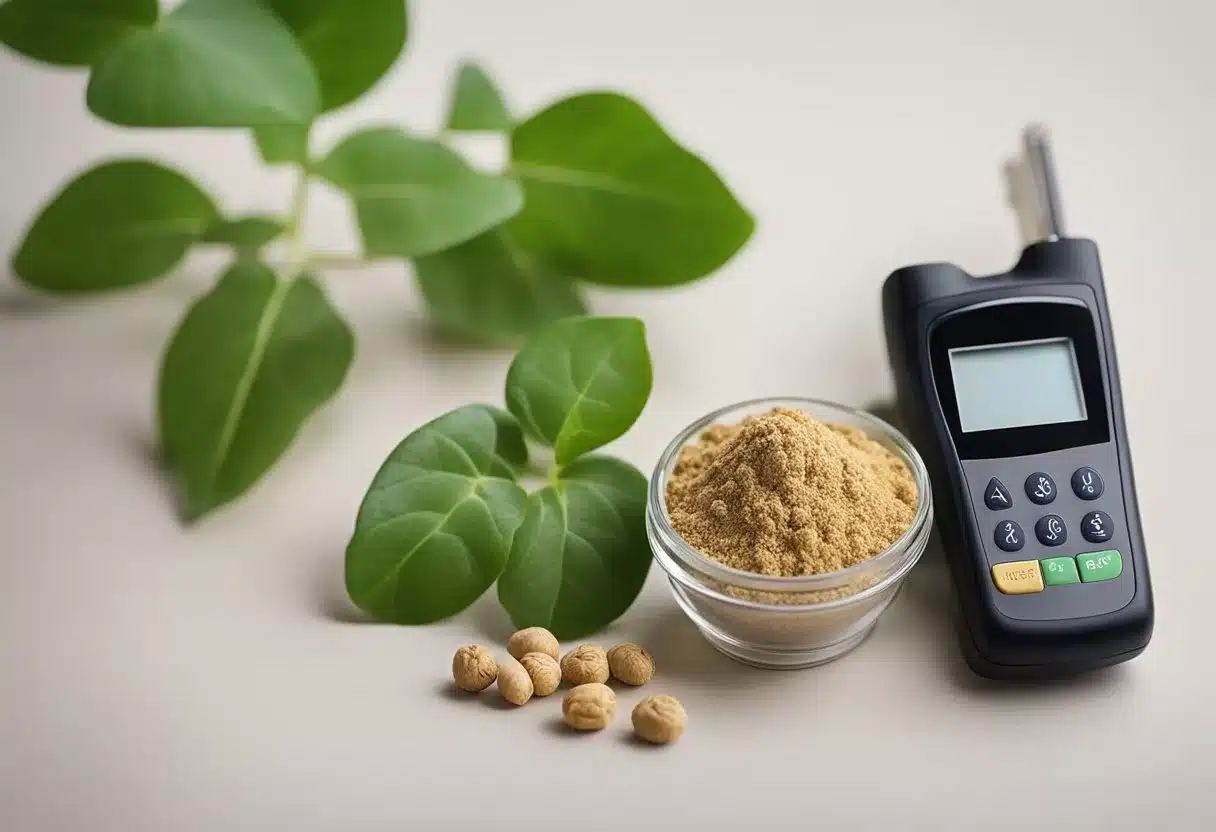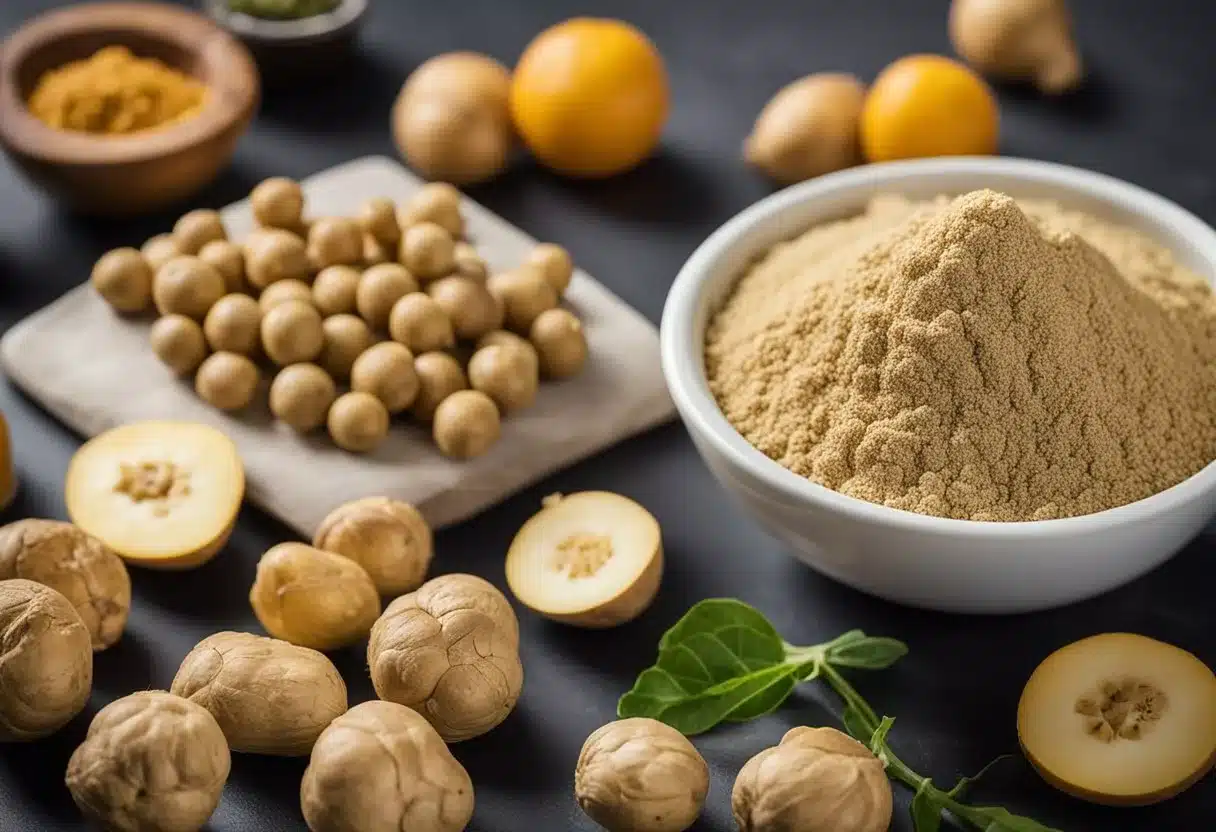Maca root has gained popularity as a natural supplement for various health conditions, including diabetes. This Andean plant has been used for centuries in traditional medicine and is now being studied for its potential benefits in managing blood sugar levels.
 [1]
[1]Maca root is a plant ingredient found in Sugar Defender[2], an advanced blend of 24 proven ingredients that supports healthy glucose levels and natural weight loss.
Research suggests that maca root may help improve insulin sensitivity and blood sugar control in people with diabetes[4]. The glucosinolates found in maca can positively affect the body’s insulin resistance, potentially aiding in the management of glucose and lipid metabolic disorders.
Maca root is generally considered safe for people with both Type 1 and Type 2 diabetes. Some studies have even shown that it may have positive effects on the bodies of those with diabetes. While more research is needed to fully understand its impact, maca root shows promise as a natural supplement for diabetes management.
Key Takeaways
- Maca root may improve insulin sensitivity and blood sugar control in diabetics
- The plant is generally considered safe for people with both Type 1 and Type 2 diabetes
- More research is needed to fully understand maca root’s effects on diabetes management
Understanding Maca Root

Maca root is a nutrient-dense vegetable with a long history of use in Peru. It comes in different colors and offers various potential health benefits.
Origin and Classification
Maca, scientifically known as Lepidium meyenii, grows in the high Andes Mountains of Peru. It’s a cruciferous vegetable related to broccoli and cabbage.
Locals have used maca for thousands of years as food and medicine. The harsh climate of the Andes helps maca develop its unique nutritional profile.
Sometimes called “Peruvian ginseng,” maca is not related to true ginseng. The name comes from its energizing effects.
Nutritional Profile
Maca root is packed with nutrients. It contains:
- Carbohydrates
- Protein
- Fiber
- Vitamins (C, B6)
- Minerals (iron, copper, potassium)
Maca also has plant compounds like glucosinolates and polyphenols. These may offer health benefits.
One key nutrient in maca is glucosinolates. These compounds might help manage blood sugar levels.
Types of Maca
Maca comes in three main colors: yellow, red, and black. Each type may have slightly different effects.
Yellow maca is the most common. It’s often used for general health and energy.
Red maca might be best for prostate health and mood. Some studies suggest it could help with fatigue.
Black maca is less common. Early research hints it may support brain function and male fertility.
All types of maca share similar core nutrients. The differences in effects are likely due to varying levels of certain compounds.
Maca Root and Diabetes

Maca root shows promise for people with diabetes. It may help control blood sugar, improve insulin sensitivity, and boost antioxidant levels in the body.
Impact on Glucose and Insulin
Maca root appears to have positive effects on glucose and insulin levels. Studies suggest it’s safe for both Type 1 and Type 2 diabetes. The root may help regulate blood sugar without stimulating insulin production from the pancreas.
For those with Type 2 diabetes, maca could improve insulin sensitivity. This means cells respond better to insulin, allowing more efficient glucose uptake.
Maca might also reduce inflammation in diabetics. Lower inflammation can lead to better overall blood sugar control.
Glucosinolates and Diabetes Control
Maca contains compounds called glucosinolates. These substances may play a key role in diabetes management.
Research indicates that glucosinolates can positively impact insulin resistance. They may help the body use insulin more effectively.
Glucosinolates could also aid in managing glucose and lipid disorders. These conditions often occur alongside diabetes.
By addressing these related issues, maca may offer comprehensive support for diabetics.
Lipid Metabolism and Antioxidative Capability
Maca root shows potential in regulating lipid metabolism. This is important for diabetes management, as lipid imbalances often accompany the condition.
Studies on HepG2 cells[4] (liver cells often used in diabetes research) found that maca extracts improved lipid metabolism. The extracts also demonstrated antioxidant properties.
Maca’s antioxidative capability may help reduce oxidative stress. High oxidative stress is common in diabetes and can worsen complications.
By supporting healthy lipid levels and providing antioxidants, maca could offer additional benefits for diabetics beyond blood sugar control.
Health Benefits of Maca Root

Maca root offers several potential health benefits. It may help with fertility, sexual function, energy levels, and menopausal symptoms.
Fertility and Sexual Function
Maca root may boost libido and sexual performance[5]. Some studies suggest it could improve fertility in both men and women.
For men, maca might help with erectile dysfunction[6]. A small study found that taking 2.4g of maca root daily for 12 weeks showed promise for this condition.
Women may also see benefits. Maca could increase sexual desire and help with sexual dysfunction. However, more research is needed to confirm these effects.
Energy and Mood Enhancement
Many people take maca root to boost energy and improve mood. While scientific evidence is limited, some users report feeling more alert and positive after using maca.
Maca contains nutrients that may support brain function. This could lead to better memory and focus. Some people find it helps reduce stress and anxiety.
It’s important to note that individual results can vary. More studies are needed to fully understand maca’s effects on energy and mood.
Support During Menopause
Maca root might help ease menopausal symptoms[7]. Some women report relief from hot flashes and night sweats when taking maca supplements.
The root may also help balance hormones during this transition. This could lead to improved mood and reduced anxiety.
Maca’s potential to boost energy might be especially helpful for women dealing with fatigue during menopause. As always, it’s best to talk to a doctor before starting any new supplement.
Safety and Side Effects
Maca root is generally considered safe[8] for most people when eaten as food. But some side effects can occur when taking it as a supplement. It’s important to understand the research, proper dosage, and potential risks.
Clinical Trials and Research
Studies on maca’s safety are limited. Some research suggests maca may have positive effects for people with diabetes. It may help reduce inflammation in those with Type 2 diabetes.
A 2021 study found that compounds in maca could impact blood sugar levels. But more research is needed to fully understand these effects.
Long-term safety data is lacking. Most studies have been short-term or done on animals. This makes it hard to know all potential risks.
Monitoring Dosage and Response
There’s no standard dosage for maca supplements. It’s best to start with a low dose and increase slowly. This helps you watch for any side effects.
Common doses range from 1.5 to 5 grams per day. Higher doses may increase the risk of side effects.
Pay attention to how your body reacts. Stop taking maca if you notice any negative effects. Talk to your doctor before starting maca, especially if you have diabetes or other health conditions.
Potential Health Risks
While maca is often well-tolerated, some people experience side effects[7]. These can include:
- Stomach upset
- Cramping
- Insomnia
- Mood changes
People with thyroid issues should be careful. Maca contains goitrogens, which can affect thyroid function.
Pregnant or breastfeeding women should avoid maca. Its effects on fetal development and infants are unknown.
Those with hormone-sensitive conditions like breast cancer, uterine fibroids, or ovarian disorders should consult a doctor before using maca. It may affect hormone levels.
Incorporating Maca into the Diet
Adding maca to your diet can be easy and tasty. There are several forms of maca available, and many ways to use it in foods and drinks.
Maca Supplements and Forms
Maca comes in different forms. Capsules and powders are common options. Capsules offer a simple way to take maca. They’re easy to swallow and have a set dose.
Maca powder is very versatile. It can be mixed into foods and drinks. The powder has a nutty, earthy taste that blends well with many flavors.
Some people prefer liquid maca extracts. These can be added to water or juice. Maca is also sold as a tincture.
When choosing a form, think about what fits your lifestyle best. Capsules are great for travel. Powder works well for cooking and baking.
Creative Ways to Use Maca Powder
Maca powder mixes well into many dishes. It can boost the nutrition of your meals without changing the taste too much.
Try adding maca to:
- Smoothies
- Oatmeal
- Yogurt
- Baked goods like muffins or bread
- Energy balls or bars
- Hot drinks like coffee or hot chocolate
Start with a small amount, about 1 teaspoon per day. You can slowly increase to 1-3 tablespoons daily.
Maca can also be used in savory dishes. Try mixing it into soups or sauces. It can add depth to the flavor of these foods.
Consideration for Raw Maca
Raw maca is available, but it’s not always the best choice. Raw maca can be hard to digest. It may cause stomach upset in some people.
Most maca sold is gelatinized. This means it’s been cooked to remove starch. Gelatinized maca is easier on the stomach. It also has a higher concentration of nutrients.
If you choose raw maca, start with a very small amount. See how your body reacts. Some people prefer the taste of raw maca. It has a stronger flavor than gelatinized maca.
Always buy maca from a trusted source. Look for organic options when possible. This helps ensure you’re getting a quality product.
Combating Diabetes with Alternative Supplements

Maca root and other natural supplements offer promising ways to help manage diabetes. They work through different mechanisms to support blood sugar control and reduce complications.
The Role of Amino Acids and Fatty Acids
Amino acids and fatty acids in maca root may help with diabetes. These nutrients can improve insulin sensitivity. Maca contains glucosinolates that may positively affect insulin resistance.
Some amino acids in maca support energy production. This can help fight fatigue common in diabetes. Fatty acids may also reduce inflammation linked to the disease.
Animal studies show maca extracts can lower blood glucose. More research is needed to confirm these effects in humans.
Anti-Inflammatory Properties in Diabetes Management
Chronic inflammation plays a key role in diabetes. Maca root has natural anti-inflammatory properties that may help.
These properties could reduce diabetes-related inflammation. This may lower the risk of complications like heart disease.
Maca may aid in reducing inflammation for those with Type 2 diabetes. It does this through its antioxidative capabilities. Antioxidants fight free radicals that cause cell damage.
By lowering inflammation, maca could help manage blood sugar levels. This makes it a promising supplement for diabetes care.
Emerging Research on Macamides and Alkaloids
Macamides and alkaloids are unique compounds found in maca. New studies are exploring their potential benefits for diabetes.
These compounds may help regulate glucose metabolism. Research suggests maca could support insulin distribution. This may make body cells more receptive to insulin’s effects.
Alkaloids in maca might also have glucose-lowering properties. However, more clinical trials are needed to confirm this.
Scientists are studying how these compounds interact with diabetes pathways. This research could lead to new ways to manage the condition.
Frequently Asked Questions
Maca root has generated interest for its potential effects on blood sugar, insulin, and other health markers in people with diabetes. Let’s explore some common questions about maca’s impacts.
Does maca reduce blood sugar levels in diabetics?
Maca may help manage blood sugar in diabetics. Some research suggests maca could positively affect insulin resistance. This may aid in controlling glucose levels.
More studies are needed to confirm maca’s blood sugar effects. Diabetics should talk to their doctor before using maca supplements.
Can maca improve insulin sensitivity?
Maca shows promise for improving insulin sensitivity. Studies indicate maca root may help insulin distribution in the body. This could make cells more responsive to insulin’s effects.
Enhanced insulin sensitivity may help with blood sugar control. However, more research is needed to fully understand maca’s impact.
Are there potential interactions between maca and metformin?
There is limited research on maca’s interactions with diabetes medications like metformin. Diabetics taking metformin should consult their doctor before using maca.
Maca could potentially affect blood sugar levels. This may require adjustments to metformin dosage.
How does maca affect blood pressure in hypertensive patients?
Maca’s effects on blood pressure in people with hypertension are not well-studied. Some believe maca may have a mild blood pressure-lowering effect.
Hypertensive patients should monitor their blood pressure if taking maca. They should also inform their doctor about maca use.
What are the effects of maca on cholesterol levels?
Research on maca’s impact on cholesterol is limited. Some studies suggest maca may help improve lipid profiles.
Maca contains plant sterols, which may influence cholesterol levels. More research is needed to confirm these effects.
Are there any specific groups of people who should avoid taking maca?
Pregnant or breastfeeding women should avoid maca due to limited safety data[9]. People with thyroid issues should be cautious, as maca contains goitrogens.
Those with hormone-sensitive conditions should consult a doctor before using maca. Maca may affect hormone levels in some people.
References
- Sugar Defender. https://8e81c8fyct2y4n4c8aiki8qmct.hop.clickbank.net/?tid=maca1 Accessed November 5, 2025
- Sugar Defender. https://8e81c8fyct2y4n4c8aiki8qmct.hop.clickbank.net/?tid=maca2 Accessed November 5, 2025
- Sugar Defender. https://8e81c8fyct2y4n4c8aiki8qmct.hop.clickbank.net/?tid=maca3 Accessed November 5, 2025
- Maca extracts regulate glucose and lipid metabolism in insulin‐resistant HepG2 cells via the PI3K/AKT signalling pathway. https://www.ncbi.nlm.nih.gov/pmc/articles/PMC8194906/ Accessed November 5, 2025
- 4 Benefits of Maca Root (and Potential Side Effects). https://www.healthline.com/nutrition/benefits-of-maca-root Accessed November 5, 2025
- 8 health benefits of maca root. https://www.medicalnewstoday.com/articles/322511 Accessed November 5, 2025
- Maca: Benefits, Side Effects, Safety Tips, Dosage, and More. https://www.webmd.com/diet/health-benefits-maca Accessed November 5, 2025
- Maca: Overview, Uses, Side Effects, Precautions, Interactions, Dosing and Reviews. https://www.webmd.com/vitamins/ai/ingredientmono-555/maca/ Accessed November 5, 2025
- Benefits of Maca Root (and Who Shouldn’t Take it). https://www.drmallorymurray.com/post/benefits-of-maca-root-and-who-shouldn-t-take-it Accessed November 5, 2025
